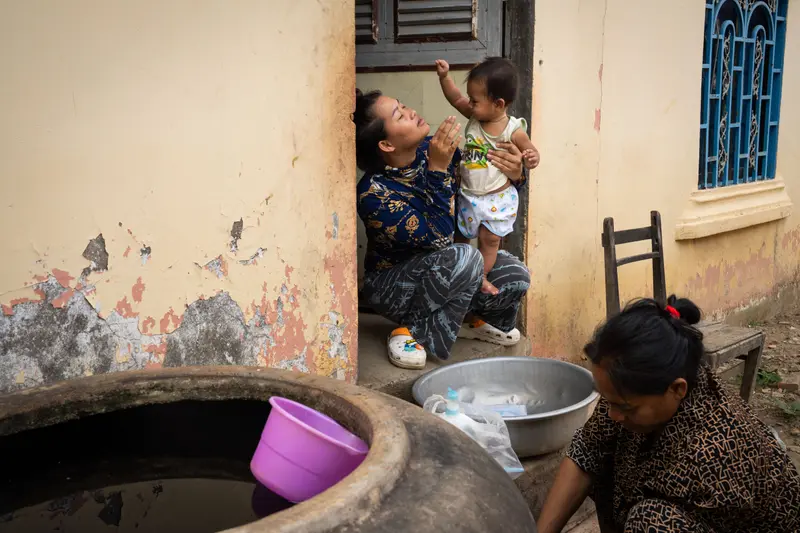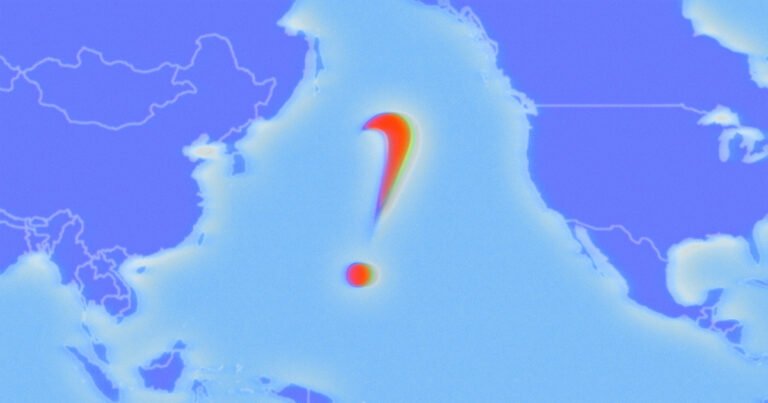This article was produced in partnership with The Oregonian/OregonLive. Sign up for Dispatches to get stories like this one as soon as they are published.
In May 2015, President Barack Obama gave a big speech about dropping trade barriers with other nations. He delivered it on a sunny day at Nike’s world headquarters in Oregon.
“Sometimes when we talk about trade, we think of Nike,” Obama said, before making his pitch for a trade deal with Asian countries that he described as the “highest-standard, most progressive trade deal in history.”
President Donald Trump canceled that deal, known as the Trans-Pacific Partnership, less than two years later.
Now, as Trump erects more trade barriers in his second administration, Nike once again is center stage in conversations about globalization, a familiar place for a company that has its roots importing Japanese track shoes and briefly made sneakers in the United States.
Last month, Trump announced sweeping tariffs that would slam imports from the countries where most Nike sneakers and apparel get made. A close look at Nike’s massive supply chain offers a case study in the possible ripple effects of the escalating global trade war and shows how vulnerable factory workers could get squeezed.
Some degree of taxation on imports has long been a feature of international garment trade, and Nike has decades of experience navigating these tariffs. The company has not spoken about how it will handle the current round under Trump, but it’s among 76 companies that signed a letter to the president last week warning about dire consequences for footwear companies unless there is tariff relief.
In response to questions about how tariffs might impact factory workers, Nike said in a statement it is “committed to ethical and responsible manufacturing.”
“We build long-term relationships with our contract manufacturing suppliers because we know having trust and mutual respect supports our ability to create product more responsibly, accelerate innovation and better serve consumers,” the statement said.
Where does Nike make sneakers and clothing?
Nike doesn’t own or operate the overseas factories that make its products. Instead, it works with 532 contract manufacturers that employ nearly 1.2 million workers, according to an online Nike map.
No country is more important to Nike’s manufacturing than Vietnam, where the brand works with 131 factories that employ nearly 460,000 workers. Half of Nike’s sneakers were made in Vietnam last year, according to the company’s annual report.
Nike’s second-largest production base is Indonesia, where its 45 contract factories employ more than 280,000 workers.
The company has been moving production out of China over the last decade. It works with 120 Chinese contract factories that employ more than 100,000 workers — down from more than 350,000 workers in 2012. Some of the footwear and apparel that Nike makes in China is sold to Chinese consumers and therefore not subject to tariffs.
Are tariffs affecting Nike?
Yes. On April 2, Trump announced “reciprocal” tariffs that included 46% on Vietnam, 32% on Indonesia and 34% on China. The next trading day, Nike’s shares fell 14%, wiping out $14 billion in shareholder value.
A week later, the president paused most of the tariffs for 90 days, but a 145% tariff on imports from China and a 10% surcharge on most imports from other countries remain in place.
Tom Nikic, a veteran industry analyst at Needham & Co., calculated that the tariffs, if fully implemented, would nearly wipe out Nike’s profits if the company made no changes to its current pricing or production.
“By my math, their earnings would decline by approximately 95%,” he said in an email.
Will Nike squeeze factories for better deals?
“Almost certainly,” said Jason Judd, executive director of the Global Labor Institute at Cornell University. “The default for a brand or retailer faced with a tariff or some other shock is to press suppliers for discounts.”
“The COVID shock is a good example,” Judd added. “We know from talking to suppliers that the COVID shock meant canceled orders and renegotiations over price.”
The Worker Rights Consortium, a labor monitoring group, estimated brands canceled $40 billion in orders during the pandemic.
When Trump announced tariffs during his first administration, Nike’s top executives said they’d find savings in their supply chain.
“We have a lot of levers we can work with, from sourcing to other levers,” Andy Campion, then Nike’s chief financial officer, said in 2019.
How will tariffs affect Nike’s factory workers?
Factory workers will likely feel the impact directly.
Dara O’Rourke, an associate professor at the University of California, Berkeley, who’s studied wages in Nike factories, said the tariffs could become a “huge hammer.”
“It is likely that you will see this kind of pressure from managers to say to workers, ‘For a period of time, we’re going to have to work harder and longer,’” he said. “Hold the line or you’re going to lose your job.”
That could mean workers are asked to make more sneakers and T-shirts every shift and work longer hours, according to Thulsi Narayanasamy, director of international advocacy for the Worker Rights Consortium.
It is likely that you will see this kind of pressure from managers to say to workers, ‘For a period of time, we’re going to have to work harder and longer.’
“When suppliers are squeezed and workers have unreasonable production targets, they don’t drink water, don’t take food breaks,” she said in an email. She added that in these circumstances, the organization consistently hears about “women having urinary tract infections, struggling with repetitive strain injuries, kidney stones, and having back problems due to rapid, repetitive movements for more than 12 hours a day.”
Narayanasamy said brands like Nike have a choice: “Push costs that they could reasonably absorb onto their suppliers, replete with the knowledge that doing so will immediately harm millions of factory workers, or not.”
In its statement, Nike said it sets clear labor expectations for supplier factories in its Code of Conduct and Code Leadership Standards.
Foreign garment workers could also face furloughs or work without pay, said Cornell’s Judd. That happened across the industry during the pandemic.
In 2021, the Worker Rights Consortium identified 31 garment factories — three of which did work for Nike — that the consortium said didn’t pay $39.8 million in severance benefits owed to 37,637 workers who lost jobs during the pandemic.
Nike previously has disputed that it owed wages to workers at the three factories named in the labor group’s report. In its statement, Nike also said factories are responsible for severance benefits.
“Manufacturing suppliers hold the financial obligation to pay worker severance, social security and other separation benefits to impacted employees in accordance with local law and Nike’s Code of Conduct,” the company said. “And in the event of any closure or divest, Nike works closely with the supplier to conduct a responsible exit.”
Will tariffs force Nike to move manufacturing back to the U.S.?
“To think this will bring jobs back to the U.S. is poorly thought out, would be the nicest thing I could say,” said Berkeley’s O’Rourke.
Footwear and apparel manufacturing remains labor-intensive. Sneakers require gluing and stitching. T-shirts require sewing. Efforts to automate shoe production have mostly flopped.
That’s part of the reason Nike makes most of its products in countries with low wages. ProPublica reported this month on a former Nike factory in Cambodia where most employees made the minimum wage — about $1 per hour.

Credit:
Sarahbeth Maney/ProPublica
Nike also uses huge factories that are filled with equipment that’s difficult to transfer to a new location. They’re often located near materials companies that make the rubbers, nylons and polyesters needed to make sneakers.
“The full production system is not easily movable,” O’Rourke said.
Instead of moving the work back to the U.S., industry watchers expect apparel companies will continue to manufacture products in countries with low wages, but manufacturing will shift to those subject to less onerous tariffs.
That could further harm workers in Vietnam, Indonesia, China and other countries with relatively high proposed tariff rates and a lot of Nike manufacturing jobs. In Indonesia, for example, one labor union expects as many as 50,000 workers could lose their jobs if the full Trump tariffs go into effect.
As the number of people looking for work increases, wages in those countries will decrease.
“The line at the gate to find work gets longer,” Judd said. “And that means employers of any kind can start paying new workers less because unemployment has jumped.”
What could tariffs mean for Nike’s prices?
Estimates vary and depend on how much of the cost Nike passes to consumers.
If the 46% tariff on Vietnam goes into effect, the price of a $155 sneaker made in Vietnam would increase to $220, according to the Footwear Distributors and Retailers of America, a trade group that counts Nike as a member.
The example, which isn’t specific to Nike, assumes the importing company passes nearly all of the tariff cost to customers. No athletic footwear brand has given specifics, although Adidas CEO Bjørn Gulden last week said “higher tariffs will eventually cause price increases.”
But Nike’s been in a slump and has been discounting many of its sneakers to boost sales.
It’s possible that Nike will absorb more of the tariff cost to avoid raising prices too steeply.
“It will likely be hard for Nike to raise prices,” the investment bank UBS recently wrote in a research note.

